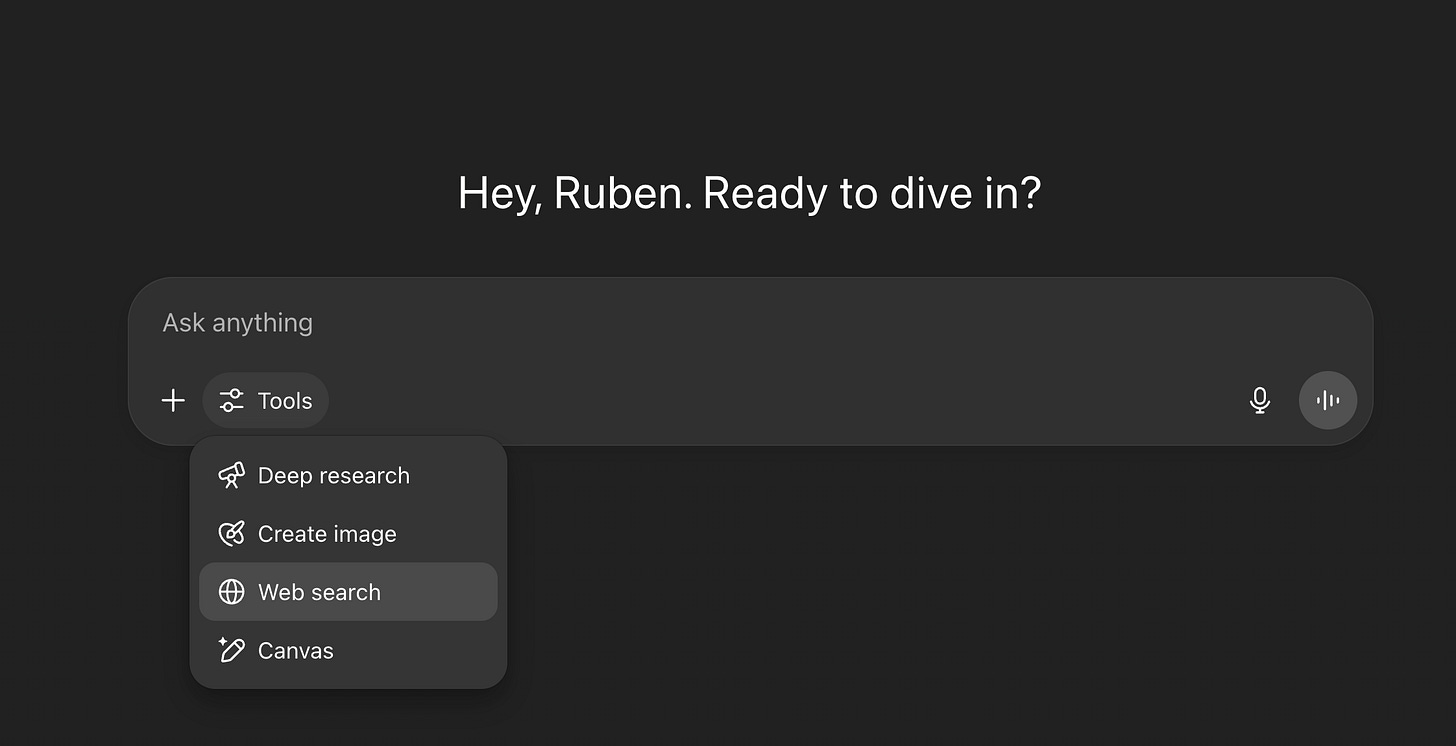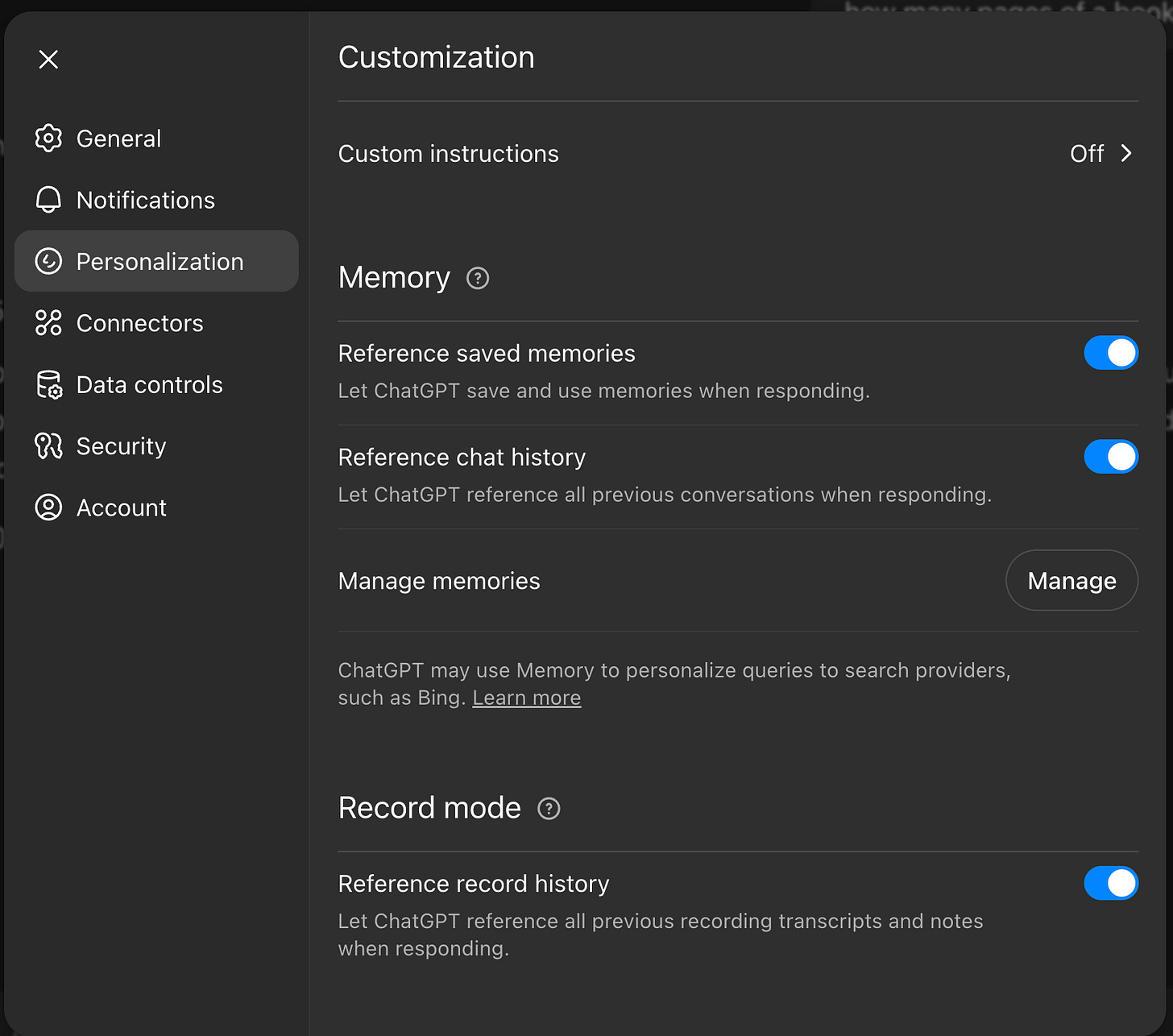16 chatgpt myths.
No, ChatGPT does not 'read' the entire internet.
No, ChatGPT does not read the entire internet.
When you ask it something (= prompt), it does not go through the entire internet to give you an answer.
This is one of the many myth around ChatGPT.
It’s time to debunk all of them. One by one.
#1 “ChatGPT knows the entire internet.”
Debunk: ChatGPT is not connected to the internet (by default).
1- You need to toggle its search feature to have access to the internet.
2- Even if you toggle it, it only goes through the first links to read some content (that you can hardly control, unless you shared a specific link).
3- And if you don’t toggle it, it simply go through its training data (mostly books, wikipedia, reddit, youtube videos transcript, papers…). It’s a lot of the internet, but not the entire internet, until June 2024.
Also, you have to “call” its data with the right prompt (hence why people love prompts). For eg. if you say “Act like a data engineer”, ChatGPT will directly go to its “data engineer database”. The answer will be instantly better.
#2 “ChatGPT remembers everything.”
Debunk: ChatGPT has a memory limit (but it gets better).
A chat forgets anything outside the ~100,000-token context.
A token is part of a word.
Here on this image, every change of color is a new token.
So 100,000 tokens is equal to a ~300-page book.
But there is a trick to get much more memory from ChatGPT.
You must turn on its “Memory” feature.
When you go in your settings, you must turn on the right ones.
Next week will be my first edition of my paid Substack, and this will be the topic: “How to set up (properly) your ChatGPT.”
You want to be in? Leave a comment to show some support.
And if you happen to not be a subscriber, here’s a one-click opt-in:
#3 “ChatGPT never lies.”
Debunk: ChatGPT (and nearly every other AI) hallucinates.
To hallucinate for an AI is to simply fabricate data.
1- It predicts the next token, not the next fact. When the data gap is big, it fills the void with fiction. Fiction can be wrong. It’s not ChatGPT’s roles to know the difference (until you prompt it to check with sources).
2- It can invent sources, quotes, even entire studies. Confidence ≠ truth.
3- Treat every reply as a first draft. Verify, cross‑check, then polish.
#4 “ChatGPT is unbiased.”
Debunk: If the training data is bad, it will be amplified.
1- Training data is the open internet. Packed with cultural, political, and historical bias.
2- Reinforcement learning fine‑tunes behavior, but humans (with their own bias) set the rules.
3- Use multiple prompts and perspectives to detect blind spots.
I wrote a blog about “confirmation bias”:
#5 “ChatGPT understands humor.”
Debunk: It understands patterns, not punchlines.
1- Sarcasm relies on lived context. ChatGPT has none.
2- Wordplay that hinges on sound (“knight/night”) often falls flat.
3- Feed it clear setups and tweak the timing. Or just write your own jokes at this point aha.
#6 “ChatGPT is private.”
Debunk: Your chats live on ChatGPT servers.
1- By default, chats are stored and may train future models.
2- OpenAI staff can review flagged content for safety.
3- Turn off “Improve the model” or use the enterprise tier if privacy matters.
#7 “ChatGPT predicts the future.”
Debunk: It extrapolates trends. Nothing more.
1- Knowledge stops at June 2024 unless you browse.
2- Future facts are probabilistic guesses. Sometimes right by luck. Like the Simpsons.
3- Ask for multiple scenarios, not certainties.
#8 “ChatGPT replaces experts.”
Debunk: Think co‑pilot, not captain.
On every possible benchmark, AI + human beats both AI or human alone.
I believe taste & experience is the ultimate MOAT no AI can reach.
Yet.
#9 “ChatGPT is free.”
Debunk: Nothing is free. Not even Google.
1- Free tiers reduce speed and context.
2- Each tokens cost OpenAI energy and money. A lot. Something like $15 million a day. A DAY.
3- The real price is either your data or your subscription.
Also, the $20 plan is much, much better than the free one. You get access to gpt-4.5 (awesome at writing) and gpt-o3 (the smartest) and deep research (the best at searching). The $200 plan is an overkill for 99.9% of you. I don’t even pay for it.
#10 “ChatGPT is safe for my confidential files.”
Debunk: It’s not (unless you have the Team plan).
1- Files can be stored up to 30 days for abuse checks.
2- They may be used to improve the model unless you opt out.
If you’re on the Team plan, you’re good. But most aren’t.
#11 “ChatGPT images are yours.”
Debunk: Ownership comes with strings.
1- OpenAI assigns you the copyright, yet you must respect trademarks and likeness rights. It’s on YOU to respect it. Most don’t.
2- Celebrity faces or branded logos can trigger takedowns.
3- Always run a reverse‑image check before commercial use.
There is no 100% safe way to protect yourself instantly.
I wish such tool existed.
#12 “ChatGPT owns the image you upload.”
Debunk: You keep the original rights, but derivatives are tricky.
1- If your upload is someone else’s IP, you still need permission.
2- Remixing a copyrighted photo can create an infringing twin.
#13 “ChatGPT uses Google to search.”
Debunk: It’s using Bing from Microsoft. So not Google.
Side note, but I can’t wait to use the new Perplexity Comet.
It’s a new AI browser that wants to compete with Google Chrome.
It’s time to step up the very thing we’re using for hours every day.
Plus I love Perplexity.
Not an ad, but if Perplexity hears me, please pay me. Thanks.
#14 “ChatGPT can’t be flirty.”
Debunk: It can, within limits.
And that’s a good thing. I hate vanilla AI. The real world isn’t.
And it’s a terrible thing when people fall in love with AI.
I don’t want to live in the movie Her. But we’re heading there.
#15 “ChatGPT can’t harm you.”
Debunk: ChatGPT psychosis is real.
People get validated in their own world’s vision until reaching total psychosis & paranoia. Remember it as a tool, a very smart intern (that can turn into a parrot).
Someone just got spiraled into it recently on X:
Check this thread if you’re interested, but it’s not for the faint of heart: https://x.com/max_spero_/status/1945896467169722812.
#16 “ChatGPT makes you dumb.”
Debunk: I wrote an entire blog about it.
You reached the end of this Sunday’s newsletter.
Note from the author: I absolutely love writing it.
It’s easily the favorite part of my week!
(Yes, I am real)
I want to take a second to thank each & every one of you.
Our “How to AI” newsletter is exploding!
People want to master AI with words, not code. Just like me.
That’s why I want to give you more. Much more.
Next Sunday, I will send you my first paid blog.
Why a paid newsletter, and not a course?
Because any AI course becomes obsolete… in 2 weeks.
I need to share weekly deep dive to make sure the content is relevant to you.
So starting next week, I will turn this newsletter into a paid one:
1 - The written part is free & yours forever. Just like you’ve been enjoying since its very beginning last year.
2 - The paid part is a weekly video walkthrough of me making a video course of the newsletter. Paying would give you access to all of the past, present & future video courses I will ever record. Expect my most advanced & hands-on video.
PS: Someone might have forwarded this email to you.
First, I’d love to personally thank this person!
Second, make sure to never miss a guide:
Humanly yours, Ruben.
Archive: https://docs.google.com/document/d/1pWuMCBVQo1zKcgKltX_BZxAr31KgxmOlp3Vzvmc5Hxc/edit?tab=t.0










Yours will absolutely be worth the subscription! Everything you have provided to date has been on point and, more importantly, explained in an easily digestible way. Thank you for that. And also please keep me looped in as wel.
Well Ruben you have done again!! It is really satisfying to read your insights. Every time your name is attached to a comment, I always take a deep look because I know I'll learn something. Thank you again.